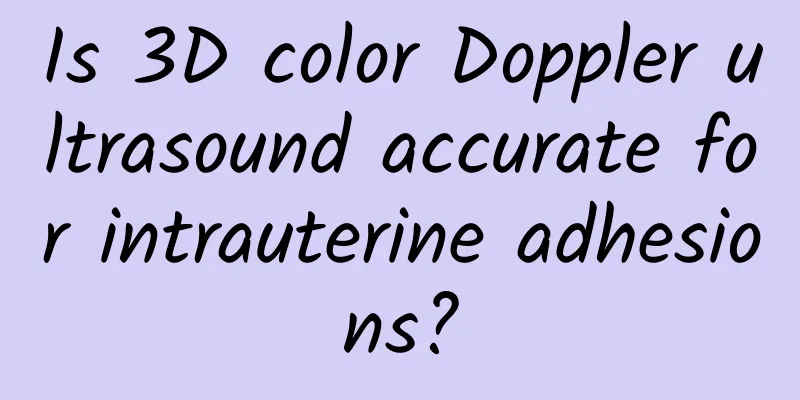Is 3D color Doppler ultrasound accurate for intrauterine adhesions?

|
Three-dimensional color Doppler ultrasound has a certain degree of accuracy in detecting intrauterine adhesions, but not all cases can be detected. Even if the results are normal, the possibility of intrauterine adhesions cannot be completely ruled out. 1. Causes of intrauterine adhesions If women do not pay attention to hygiene or resume sexual life too early after a miscarriage or uterine curettage, it may cause uterine adhesions. Multiple miscarriages or uterine curettages are also risk factors. If menstruation has not occurred for more than 40 days after miscarriage, a 3D color Doppler ultrasound examination is recommended. This examination can help observe whether there are adhesions or residues in the uterine cavity. If residues are found, it is very important to perform uterine curettage treatment in a timely manner. 2. Potential impact of infertility Intrauterine adhesions may lead to infertility, which is an important consideration for women planning pregnancy. If intrauterine adhesions are suspected, a three-dimensional vaginal ultrasound is recommended during menstruation. Compared with ordinary examinations, vaginal ultrasound provides more direct and accurate information. If intrauterine adhesions are confirmed, hysteroscopic surgery can be performed within 3 to 7 days after the end of menstruation. 3. Preventive measures and health advice The key to preventing intrauterine adhesions is to maintain good personal hygiene habits, especially in terms of sexual life. If you do not plan to get pregnant, be sure to take contraceptive measures to avoid the harm caused by multiple miscarriages. Regular gynecological examinations are also an important step to ensure reproductive health. 4. Limitations of 3D Color Doppler Ultrasound Although 3D color Doppler ultrasound has its advantages in detecting intrauterine adhesions, it cannot completely replace other means of examination. If the 3D color Doppler ultrasound results are normal but the symptoms persist, the doctor may recommend further examinations, such as hysteroscopy, to obtain more detailed information. 5. Personal experience and suggestions When facing possible intrauterine adhesions, it is important to maintain a positive attitude and good communication. Discuss all possible examinations and treatment options with your doctor and choose the path that suits you best. At the same time, pay attention to changes and signals in your body and seek professional help in a timely manner. Through the above information, I hope to help you better understand the role of 3D color Doppler ultrasound in the detection of intrauterine adhesions and how to take preventive measures in daily life. Maintaining a healthy lifestyle and regular check-ups are key to ensuring reproductive health. |
<<: What to eat after menopause to delay aging
>>: Does a 5.5 cm uterine fibroid require surgery?
Recommend
A must-see for those who want to lose weight! 11 types of landmine foods to avoid
If you want to lose weight, you must know what fo...
Brief analysis of several common treatment methods for vulvar leukoplakia
Among the common methods of treating vulvar leuko...
Interventional therapy: a new minimally invasive treatment for uterine fibroids
There are some advantages to interventional treat...
Recognize the symptoms of menopausal depression
It is common for menopausal women to suffer from ...
What is the reason for red pimples on the face during menstruation?
What is the reason for red pimples on the face du...
Women should be on guard against the causes of adnexitis in a timely manner
At present, adnexitis is one of the more common f...
Do I need to make an appointment for vaccination?
Do vaccinations require appointments? The answer ...
What are the symptoms of habitual miscarriage? Pay special attention to these 4 symptoms
Nowadays, women are under great pressure in life....
The natural enemy of fat! 30-Day HIIT Training
The ratio of body fat to muscle composition can g...
Different types of pelvic inflammatory disease patients have different dietary treatments
Traditional Chinese medicine pays attention to th...
The main symptom of uterine fibroids is vaginal bleeding
In gynecology, the symptoms of uterine fibroids a...
What color is the color of a miscarriage? How long after a miscarriage can you go out?
Early miscarriage is a problem that many women of...
Recommendations for the prevention and treatment of hyperprolactinemia
Hyperprolactinemia is a disease that is not famil...
What are the symptoms of cervicitis?
Cervicitis is one of the common gynecological dis...
Spring Festival diet hides the risk of obesity and chronic diseases! Master the "Three Lows and One High" trick to avoid worries
The Lunar New Year is approaching, and it is a gr...









